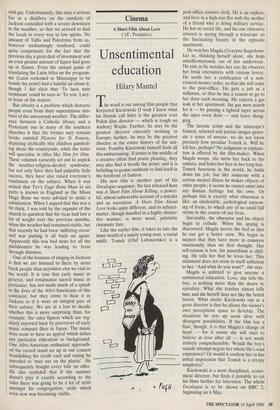Cinema
Unsentimental education
Hilary Mantel
The word is out among film people that Krzysztof Kieslowski (I wish I knew what his friends call him) is the greatest ever Polish film director — which is tough on Andrzej Wajda. Further, he may be the greatest director currently working in Europe; further, he may be the greatest director in the entire history of the uni- verse. Possibly Kieslowski himself finds all this embarrassing. If artists in the middle of a creative effort find praise pleasing, they may also find it beside the point; and it is belittling to genius suddenly to find itself in the forefront of fashion.
His new film is another part of his Decalogue sequence; the last released here was A Short Film About Killing, a power- ful, almost unbearable account of a murder and an execution. A Short Film About Love looks quite different, and its subject- matter, though handled in a highly distinc- tive manner, is more usual, palatable cinematic fare.
Like the earlier film, it takes us into the inner world of a lonely young man, a social misfit. Tomek (Olaf Lubaszonko) is a post-office counter clerk. He is an orphan, and lives in a high-rise flat with the mother of a friend who is doing military service. He has no social life, and his one obsessive interest is spying through a telescope on the fascinating beauty in the opposite apartment.
He watches Magda (Grazyna Szapolows- ka) as, thinking herself alone, she hops unselfconsciously out of her underwear. He eats as he watches her eat; he observes her brisk encounters with various lovers. He sends her a notification of a non- existent money order, so that she will come to the post-office. He gets a job as a milkman, so that he has a reason to go to her door each morning. He reports a gas leak at her apartment; the gas men search for it — by passing a lighted taper across the open oven door — and leave shrug- ging.
The laconic script and the telescope's framed, selected and partial images gener- ate a sense of unease; we do not know precisely how peculiar Tomek is. Will he kill her, perhaps? No judgment or explana- tion is offered by the film-maker. When Magda weeps, she turns her back to the camera, and hides her face in her long hair. Tomek functions in the world, he holds down his job, but like someone with a serious mental illness he makes objects of other people; it seems he cannot enter into any human feelings but his own. Or perhaps this is exactly what obsession is like: an intolerable, pathological narrow- ing of focus, to which any of us could fall victim in the course of our lives.
Inevitably, the obsessive and his object begin to collude. When his spying is discovered, Magda moves the bed so that he can get a better view. We begin to suspect that they have more in common emotionally than we first thought. Her self-esteem is low, his masochism is chill- ing. He tells her that he loves her. This statement does not seem in itself sufficient to her. 'And what do you want?', she says.
Magda is unfitted to give anyone a sentimental education. Love, she tells the boy, is nothing more than the desire to ejaculate. What she teaches almost kills him; and she herself does not like the brutal lesson. What marks Kieslowski out as a great director is that he allows the viewer's own perceptions space to develop. The situations he sets up seem alive with divergent possibilities. If the film has a flaw, though, it is that Magda's change of heart — for it seems she will start to believe in love after all — is not made entirely comprehensible. Would the boy's suicide attempt negate her whole life's sour experience? Or would it confirm her in her initial impression that Tomek is a creepy simpleton?
Kieslowski is a most disciplined, econo- mical director, but finds it possible to cut his films further for television. The whole Decalogue is to be shown on BBC 2, beginning on 6 May.


















































 Previous page
Previous page